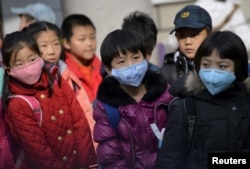Earlier this year, China began allowing non-governmental organizations (NGOs) to file class action lawsuits against polluters, and in late October one of the first NGOs to file a suit won a victory in court.
China has some 700 NGOs that are qualified to take on environmental legal cases, but since January there have been only 40 suits against polluters. The groups say that so far the effort to fight pollution has had mixed results and enforcement remains a key challenge.
Small victories
Environmental groups so far are celebrating small victories which they say establish important precedents for environmental prosecutions.
In late October two NGOs, Friends of Nature and Fujian Green Home, won a lawsuit against four people accused of severely damaging vegetation near a quarry on a hillside in Nanping, Fujian.
The court ordered the defendants to clear their illegally-occupied facilities at the quarry within five months, and to restore vegetation they had damaged by planting trees over the next years. The accused were also asked to pay $200,000 in compensation.
Maple Ge, director of law and policy department at Friends of Nature, said even though it was a relatively small case, it was an important milestone because expert witnesses were consulted and the compensation established a precedent.
“For example, the court asked the defendants to not only pay for the losses of the damages as a result of their illegal occupation, but also reasonable cost incurred by the plaintiffs, which filed the suit to seek restoration, including travel expenses and fees for lawyers.”
400 disasters in 2014
While such cases are the bright spots for environmental activists, the challenge remains daunting. In 2014 China reported more than 400 environmental disasters. Activists say that the government should allow more NGOs to bring suits against polluters. The would mean loosening the current law that only allows firms that have existed for at least five years to bring suit.
Since January, when the amended Environmental Protection Law took effect, 10 of the qualified NGOs have filed some 40 lawsuits against polluters. The majority of the suits are backed by the China Biodiversity Conservation and Green Development Foundation.
But despite the foundation's size, it has found it difficult to convince courts in some cases to prosecute polluters.
In Ningxia province, a base for coal and chemical industries, the foundation had eight pollution cases rejected by the court in Zhongwei City, because it argued the foundation was not a legitimate entity to take legal action.
“We found people [of the court] had a problematic mindset or were probably under the influence of other factors, which we didn’t know for sure,” said a foundation staff member, nicknamed Great Wind, who requested anonymity.
“Not only we found the rejection ridiculous, many experts also agreed that the dismissal simply represented a denial of a white horse as a horse,” he said, adding that the level of pollution in Ningxia is worse than some of those provinces in the eastern coast.
Local government action needed
Activists say the best way to improve China's track record on pollution is to create a way for the outside groups or environmental watchdogs to keep a tab on the actions of local governments.
“Relevant institutes or organizations should be allowed to take legal action against the inaction or violation of laws by the [local] governments,” said Friends of Nature's Maple Ge. “That is, citizens should have the rights to sue the governments, the significance of which is to ensure public scrutiny over [the work of] the public sector body.”
Last week, China's State Council announced a trial run of a plan that could demand more accountability of local governments. The plan calls for a few provinces to start an ecological damage restoration and compensation system and will hold local governments responsible for collecting compensation from individuals and companies that pollute, in particular those who damage state properties.
Two-year trial
After a two-year trial, the council intends to roll out the plan nationwide in 2018. The program targets air, water, soil pollution and damage to plants and animals, according to state media reports.
Under the new plan, local governments would be empowered to recommend revisions of legislation while putting together teams of experts or organizations to assess the damage and the required cost for restoration work before taking legal action against the polluters for claims.
It will be mandatory for local governments to report their progress to the State Council every August as part of its annual evaluation of local government officials’ performance.
Although some environmental groups are waiting to see how effective local governments will be at policing polluters, Cao Mingde, law professor at the China University of Political Science and Law, said it's an important step because it forces local governments to take a more active role.
The action of local governments, he said, has long been the key to either make or break the country’s efforts in reducing pollutants.
“Local governments tend to pursue economic growth and put the environment protection work on the back burner, which is why many of the central government’s environment protection policies have failed to follow through,” said Cao, who had participated in amending the Environment Protection Law.






